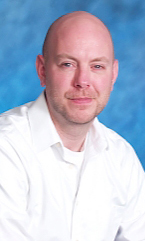Eric Metcalf
Self-Employed Health Writer

Degree(s): BJ '94 (News-Editorial)
Whereabouts: United States, Indianapolis, Indiana
What do you do?
I write health-related features for WebMD and a variety of custom publications; write scripts for an online “medical minute” video series; author and contribute to health books (my most recent book, which I co-authored, is The New Prescription: How to Get the Best Health Care in a Broken System, which was published by HCI Books in spring 2011); and do infotaining pieces for Sound Medicine, a radio program carried on NPR stations. I also perform improv comedy in my spare time, when I find some, at ComedySportz in Indianapolis.
What makes you good at your job?
Accuracy. And always making my deadlines. Also, I tend to understand medical terminology and concepts pretty easily. I picked up a master’s degree in public health, which has helped improve my grip on the statistics involved in medicine, as well as the reasons why people make wise and unwise health-related decisions.
How did you get your job?
My last real job – i.e, a job working for someone else – was at Rodale, a leading health and fitness publisher. I left in 2002 to enroll in grad school part-time. I managed to get some freelance work right away and realized that freelancing would be easier to fit in with my schedule than working for one of the handful of local media and publishing companies. I’d made a number of great connections at Rodale who helped me get on my feet, and I’ve slowly expanded my clients and the types of work I do.
What are you currently working on?
At the moment, I’m co-authoring a book with a psychiatrist, and I’m wrapping up a WebMD story. I may go hop on my bike for awhile, walk the kids back from the bus stop and get back to work in my home office.
What has been your greatest professional achievement?
Helping a national audience make healthier choices in their lives.
Where would you most like to work and why?
I’ve thought about looking for a “job” over the years, but the pros of being self-employed always outweighed the cons. I could see enjoying many types of jobs in a variety of medical-communication settings, but I still enjoy the variety of assignments I’m doing now after nine years. And by my count, a few thousand other clients are out there whom I might like to work with as a freelancer.
Best professional lesson learned at the J-School?
The ability to walk into any situation and interview the people there – from blue-collar workers to highly advanced experts. This requires thoroughly preparing for the interview and being able to speak the language of your subject. I interview complete strangers about their diseases and Harvard doctors who have five minutes to talk on the phone. You have to know how to approach each person differently.
What would be your best advice to current students?
Learn to be your own boss. In this economy, no employer is going to be as concerned about your success and fulfillment and happiness and ability to pay your rent as you are. Always be networking, marketing yourself and developing skills that other people don’t have. Find a niche and own it. That goes for if you have a “real job” or are freelancing.
What are your next career steps?
I’d like to do more radio/broadcasting work, and get into medical voiceover work. Otherwise, I just want to keep finding new and interesting things to do.
What is something about you that may surprise people?
I try not to surprise people. Life is startling enough.
Updated: November 9, 2011